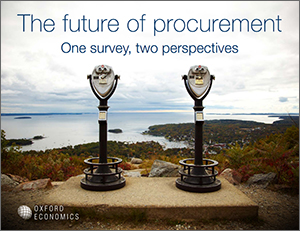Ungated Post | 06 Jul 2015
The Future of Procurement

The procurement function is becoming more strategic, more collaborative, and more technology-driven than ever before—and these transformative trends are ongoing. But at most companies, procurement still has challenges to address in terms of technology, organization, and human capital before it is a truly strategic function.
In early 2015, Oxford Economics worked with SAP to better understand where procurement is now and where it is headed. We fielded two surveys across 18 countries—one of more than 500 senior procurement executives, the other of over 500 non-executive procurement practitioners (e.g., category managers, sourcing staff, buyers, and procurement operations specialists). We also conducted a series of live interviews with executives from the industries and regions surveyed.
About SAP
The market leader in enterprise application software, SAP helps organizations fight the damaging effects of complexity, generate new opportunities for innovation and growth, and stay ahead of the competition. To find out more, please visit: sap.com
Oxford Economics’ team is expert at applying advanced economic tools that provide valuable insights into today’s most pressing business, financial, and policy issues.
To find out more about our capabilities, contact:
Americas
Diantha Redd
+1 (646) 503 3052
Email
Asia Pacific
Peter Suomi
+65 6850 0110
Email
EMEA
Aoife Pearson
+44 (0)203 910 8054
Email
Related Services

Post
The economic impact of abandoning the WTO
Oxford Economics have been commissioned by the International Chamber of Commerce (ICC) to provide an independent assessment of the economic impact of WTO dissolution. This report details our findings and the assumptions underpinning our analysis.
Find Out More
Post
The economic impact of the sports activities of public service media
This study shows how the sports activities of public service media supported €4.5 billion of GDP and 57,000 jobs across 31 European countries in 2022, taking direct, indirect (supply chain), and induced (wage-funded expenditure) impacts into account. The report also highlights wider economic benefits of public service media sports coverage, such as the way in which it leverages sponsorship income for sports bodies.
Find Out More
Post
Global Trade Education: The role of private philanthropy
Global trade can amplify economic development and poverty alleviation. Capable leaders are required to put in place enabling conditions for trade, but currently these skills are underprovided in developing countries. For philanthropists, investing in trade leadership talent through graduate-level scholarships is an opportunity to make meaningful contributions that can multiply and sustain global economic development.
Find Out More